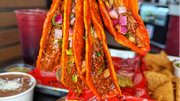Commentary
How food truck owners can protect their business before they hit the road
Finding the appropriate insurance plans to cover every aspect of the food truck can be confusing for vendors who are new to the industry. A veteran insurance broker with a working knowledge of food trucks offers some helpful tips.

August 9, 2018
by Denise Smith
As the weather heats up and people look to make the most of summer, the demand for food trucks at festivals and events is skyrocketing.
On top of regulations and unpredictable weather, food truck operators also should consider the legal cost of operating a mobile restaurant. Specifically, finding the appropriate insurance plans to cover every aspect of the food truck can be confusing for vendors who are new to the industry.
What to watch out for
When it comes to health and safety, food trucks are tasked with handling a unique set of challenges not found with a traditional brick-and-mortar restaurant. With limited space to work with and unpredictable weather, vendors need to be prepared to handle multiple situations that can adversely affect the food they serve.
Unlike at a large restaurant kitchen, food truck workers are often operating in cramped quarters filled with sharp knives and hot stoves. During peak business hours, the possibility of an accident occurring is high — cooks can bump into one another or injure themselves on cooking utensils. In addition to slips and falls that occur in or around food trucks, vendors could also be held accountable for damage caused by appliances that aren't bolted down to their vehicles.
Food safety is another issue cooks should be thinking about when they lack access to a full-fledged kitchen. The Los Angeles Times, for example, found California food trucks to be lagging behind food carts and restaurants when it comes to health scores. Food trucks were forced to close at a rate three times higher than regular restaurants due to a variety of food safety infractions from cross-contamination to rodent infestations.
Regulating the kitchen's temperature also becomes significantly harder to control in a truck compared to a physical restaurant. In the summertime, when food trucks are in high demand, extreme heat can spoil necessary ingredients and lead to foodborne illnesses in paying customers.
Coverages to consider
So what constitutes the right amount of coverage? Some vendors prefer to purchase insurance on an event-by-event basis, but this coverage may be insufficient or fail to cover unexpected crises. To protect your entire operation, it's recommended that food vendors consider investing in a combination of the following plans:
- General liability insurance. The minute a customer steps up to a truck's window, the vendor becomes liable for any accident that occurs. General liability insurance protects food trucks from third-party lawsuits over incidents such as illnesses, physical injuries, copyright infringements and property damage. General liability usually covers claims brought against the vendor and its employees, and most coverage limits for food trucks are approximately $1 million per occurrence and $2 million aggregate.
- Workers' compensation. Like any other restaurant, food trucks typically employ a number of individuals to keep the business running. With cooks to cashiers to drivers to take care of, vendors should consider investing in workers' compensation to pay for things like wage replacements or medical expenses. The majority of states require workers' compensation insurance for any business with employees, but the amount of coverage needed will vary from state to state.
- Commercial auto insurance. Because general liability insurance doesn't cover business-owned vehicles, food truck vendors should look into purchasing commercial auto insurance for their operations. Commercial auto insurance is usually mandatory for food trucks because it is needed when filing for permits or licenses with the city, and covers things like legal defense costs, collisions and repair costs.
- Property insurance and off-premise coverage. In addition to protecting the truck itself, vendors may want to consider insuring business assets like the space they operate in, loose equipment on the truck and inventory necessary for operations. Property insurance covers items that might be damaged in a kitchen fire or natural disaster, such as equipment and any items not attached to the truck.
When in doubt, it's helpful for food truck operators to consult with their attorney to ensure they have the appropriate coverage plans in place. The last thing any food vendor wants is to be uninsured in the middle of catering a summertime event when their freezer short circuits. With the right coverage plan in place, vendors can confidently operate wherever their business takes them while mitigating insurance risks.
Denise Smith is a commercial insurance broker at Insureon, based in Chicago.
 ChatGPT
ChatGPT Grok
Grok Perplexity
Perplexity Claude
Claude





